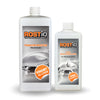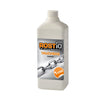Rusty finds from metal detectorists
Some of our customers, so-called metal detectorists, are out and about with metal detectors and discover iron objects in the ground, which they then want to derust later. Such finds are usually extremely rusted, so it takes some time to completely derust them.
In this article, we show the derusting of a fragment of a cannonball from the German-Danish War of 1850. The object had been buried in the ground since the war and was found and recovered with a metal detector in autumn 2017.
Rust removal with Rostio Intensive immersion bath
The cannonball fragment was stored in distilled water until its derusting in December 2017. In preparation, coarse, loose rust was knocked off with a hammer. Undiluted Rostio Immersion Bath Intensive was used to derust the soil find. After approximately 24 hours, the cannonball was removed from the bath and scrubbed with a brush under running water. The object was then immersed in the Rostio immersion bath for another 48 hours.


Initial situation: Fragment of the cannonball in its found state


Coarse rust was knocked off with a small hammer


After 24 hours, some rust was already removed


After another 48 hours the rust was completely removed


Here are some pictures from the site
The cannonball fragment is now rust-free and can be further processed according to your taste. For example, you could simply boil it in microcrystalline wax or seal it with Renaissance wax – this will give you a dark gray, antique-looking surface. Another option would be to let the ball rust slightly again and then coat it with Rostio Rust Converter. This will produce a dark gray/black surface. If you prefer a more authentic rust look, you can simply let the object rust again until an even layer of rust has formed. This is then briefly desalted and sealed with wax. As always, it's all a matter of taste.




